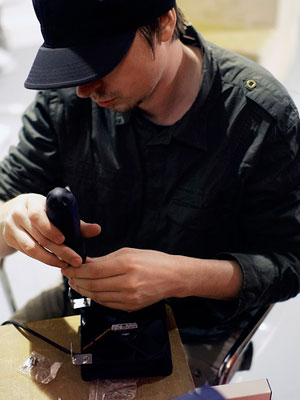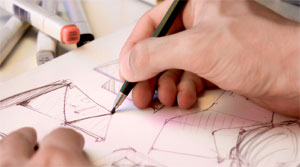Industrial Designer
Tasks & duties

Industrial designers may do some or all of the following:
-
analyse clients' requirements
-
create or update designs
-
prepare drawings and models
-
discuss design ideas with clients
-
work out material and process requirements
-
provide clients with budgets for production of designs
-
analyse product patent documents
-
test the durability, efficiency, or comfort of products (ergonomics)
-
run their own businesses
Specialisations
Industrial designers working for large organisations may specialise in a particular area of the industrial design production process, such as concept work (sketching product ideas), or three-dimensional modelling using computer-aided design (CAD) programs.
They may also specialise in designing products made from a particular material, for example, plastic.
Skills & knowledge

Industrial designers need to have:
-
drawing and artistic skills
-
knowledge of design and production standards
-
knowledge of manufacturing and construction materials and processes, including eco-friendly options
-
knowledge of ergonomic design (how to design for users' comfort and efficiency)
-
good communication skills
-
the ability to interpret clients' ideas
-
analytical and problem-solving skills
-
business skills
-
computer-aided design (CAD) skills
-
knowledge of maths and physics
Entry requirements
To become an industrial designer you need a degree in either industrial, graphic or architectural design; however, industrial design degrees are preferred by most employers.
A portfolio that demonstrates your design and creative ability is also necessary.
Secondary education
A tertiary entrance qualification is needed to enter tertiary training.
Useful subjects include:
-
art design
-
design technology
-
graphic design
-
computer studies
-
English
-
maths
-
workshop technology
Tertiary education
Industrial design programmes are available at the following places:
-
Massey University – Bachelor of Design (Industrial Design)
-
Unitec – Bachelor of Design and Visual Arts (Product and Furniture Design)
-
Victoria University – Bachelor of Design Innovation (Industrial)
-
University of Otago – Bachelor of Design Studies.
Training on the job
Skills are gained on the job. Once qualified, industrial designers may join the Designers Institute of New Zealand (DINZ), and attend their seminars and continuing professional development workshops.
Useful experience
Useful experience for industrial designers includes:
-
drawing experience
-
computer-aided design (CAD) experience
-
draughting work
-
architecture or interior design work
-
craft or furniture design
-
manufacturing work in a workshop
-
running a business
Related courses
Architecture
Graphic Arts and Design Studies
Interior and Environmental Design
For more information, please refer to Career Services.
Document Actions
